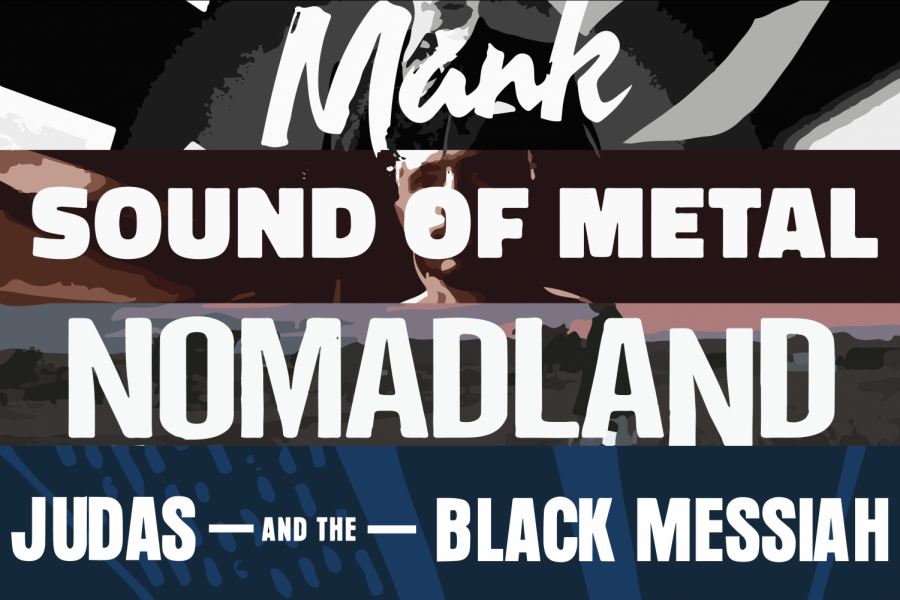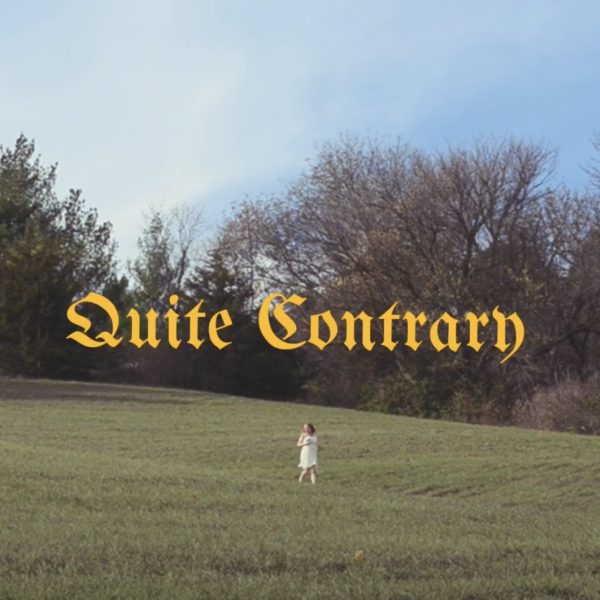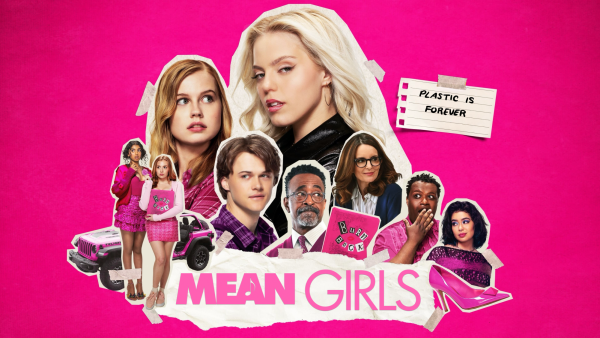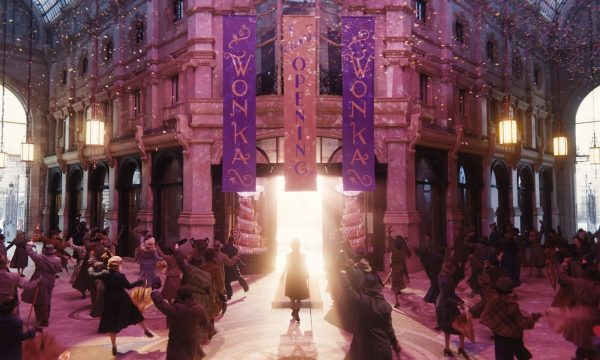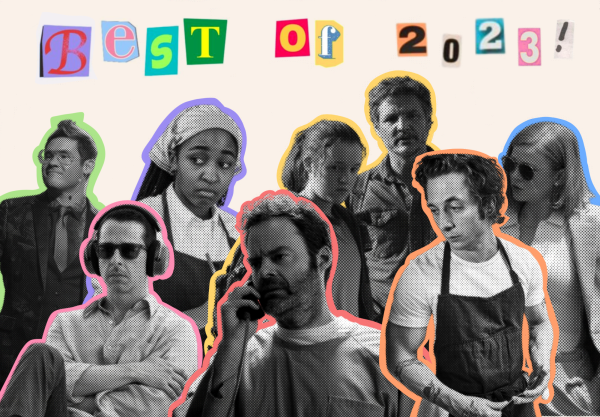Best Picture Preview: Mank, The Sound of Metal, Nomadland, Judas and the Black Messiah
The award for Best Picture will be announced at the 2021 Oscars on Sunday, April 25th.
With the start of every Oscar season comes another batch of Best Picture nominees to watch and collectively complain about when the Academy snubs the best one. Jokes aside, as the slightly-delayed 2020 Oscars are right around the corner, I decided to watch and review all of the films that were nominated for Best Picture. Since there are eight films up for the award this year, this review will be split into two parts, with this one going over the first four nominees: “Mank,” “The Sound of Metal,” “Nomadland” and “Judas and the Black Messiah.” All of these reviews are spoiler-free and simply a rundown of what the film is about, with some of my opinion and speculation on the awards they might receive thrown in as well. Keep in my mind my opinion isn’t fact, and I’d encourage you to check out all of these films and form your own opinions on them before the 2021 Oscars premiere on April 25th!
Mank:
Even if you’ve never seen it, you’ve likely heard of “Citizen Kane,” the 1941 drama starring Orson Welles which is largely considered to be one of the best films of all time. In David Fincher’s latest film, “Mank”, the backstory of writing “Citizen Kane” is told through the eyes of Herman J. Mankiewicz (Gary Oldman) in a story which is as stylistic as it is the epitome of movies the Academy loves: “scathing” satires of old Hollywood.
As someone who loves “Citizen Kane” (who wouldn’t?), I can largely say that “Mank” paid great homage to its source material through its editing style and production design. All of the old-timey title cards and references Fincher managed to include throughout the film didn’t go unnoticed for me. I’m sure there are tons of other things I’d notice hidden throughout the film on a second viewing. As for the film’s editing style, it made the movie feel much older than it is. Parts of “Mank” mirrored shots from “Citizen Kane” eerily, which was impressive considering it was made 80 years later. I also really enjoyed the film’s editing in a particular psychedelic sequence in the middle, which, without spoiling anything, is one of the best scenes in the movie.
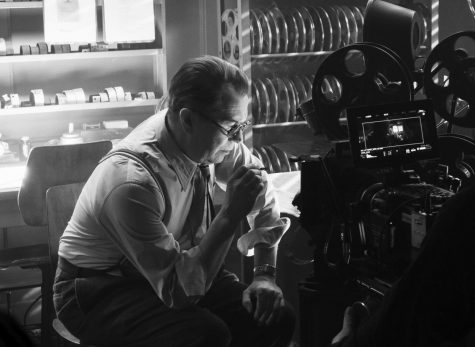
I’ve heard a few people say that they didn’t like Gary Oldman in the role of Mankiewicz, but I didn’t have any problems with his performance. Personally, I thought he fit Mankiewicz well, but if you aren’t a huge fan of Oldman already, I wouldn’t suggest watching a character study where his performance is the main focus. As for other performances in the film, Amanda Seyfried, the actress who plays Marion Davies, is totally deserving of her Best Supporting Actress nomination. If I wasn’t already hoping for Maria Bakalova to win Best Supporting Actress for “Borat: Subsequent Moviefilm,” Seyfried would easily be my pick. My only major problem with “Mank” is in its ending. Maybe it’s just because so many of David Fincher’s films are masterpieces at this point, but “Mank” had nowhere near the impact in its ending as “The Social Network,” “Gone Girl,” or even “Seven” did for me. I also wish the film had more to it than just being similar to “Citizen Kane.” As I’ve stated before, I love that movie, but if a film is making me want to go and watch a different film instead of it, that feels like a red flag. Regardless, I appreciate “Mank” a lot for its editing, production design and performances. However, in terms of actually watching it, I’d suggest watching “Citizen Kane” before coming anywhere near this film.
The Sound of Metal:
As someone who primarily edits podcasts in their free time, “The Sound of Metal” is a sound editor’s dream and that isn’t even the half of it. Director Darius Marder’s latest film tells the story of a heavy metal drummer named Ruben Stone (Riz Ahmed) after he begins to lose his hearing. What follows is a heavy, thought-provoking drama about the pursuit of passion in the face of adversity, complete with excellent sound design, editing and an incredible set of performances. Without a doubt, the film is easily one of my favorites up for Best Picture this year.
It’s impossible to talk about “The Sound of Metal” without first getting into its main performance by Ahmed. To put it simply, Ahmed’s performance is fantastic. There’s so much depth to his character and I loved seeing how his performance echoed Ruben’s complex emotions. I felt so much empathy for his character in the film, while also being frustrated with his actions at points, but I was never taken out of the film because of how real Ahmed’s portrayal felt. In addition, considering how Ahmed is playing a character that is deaf for the vast majority of the film, his performance is all the more impressive. As far as I know, Ahmed took a page out of Christian Bale’s book and actually deafened himself to play the role; he’s just that convincing throughout the film. Paul Raci’s performance in the movie is also great and he really transforms into his role. I doubt Raci will win in his category of Best Supporting Actor since he’s up against LaKeith Stanfeld and Daniel Kaluuya (the other two best performances of the year I’ve seen so far), but I loved his performance regardless.
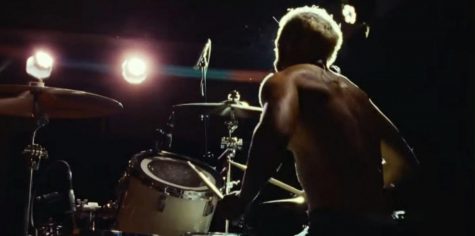
The major thing I would tell someone before they watch “The Sound of Metal” is that it starts out going one direction, similar to a film like “Whiplash,” but where it ends up going is totally different. I really wasn’t expecting “The Sound of Metal” to have dramatic elements when the film introduced them, but I thoroughly enjoyed them nonetheless. I can’t say much about the incredible sound design elements in the movie without spoiling things, but the way that the film is able to put you into the perspective of the main character is truly groundbreaking and makes me excited for the future of cinema as an art form. If you haven’t seen “The Sound of Metal” yet, I would highly recommend going in as blind (and deaf?) as possible. It is truly an experience like no other and I think almost anyone can watch it and relate to it in some way. While I don’t expect this film to win Best Picture – as it’s not as strong as some other contenders – it’s still a great film in its own right, and definitely deserves the nomination.
Nomadland:
Even though I’d never do it, the idea of “living off of the land” with only the shirt on your back and what you can carry has always been fascinating to me. In director Chloé Zhao’s latest film, “Nomadland,” the idea of living solely by your wits is given a whole new meaning with Fern (Francis McDormand), a modern-day nomad who spends her days living on the American frontier in a van that she calls her home. Featuring an excellent performance by Francis McDormand as well as some impressive cinematography, I expect “Nomadland” to reel in its fair share of awards this Oscar season, even if its premise wasn’t as fully realized as I would have hoped.
Right off of the bat, Francis McDormand was what carried “Nomadland” for me. I really appreciated many aspects of the film, but I could tell McDormand was giving her all in every scene in the movie, and I appreciated her commitment to the character. As for other positives, “Nomadland” also had excellent cinematography, and I expect it to easily win that category at the Oscars. I love how many shots there were of McDormand simply walking from place to place while the landscape behind her glowed with the fragrant pastels of the Nevada scenery. The film’s cinematography was one of the only reasons, outside of McDormand’s performance, that I was even interested in the film as it went on.

My major issue with “Nomadland” is that, in my opinion, it doesn’t seem to go anywhere after the first hour. I was really interested in the story in the first half and was eager to see how McDormand’s character would change as the story progressed, but she really didn’t have much of an arc. Without spoiling anything, the end of the film left me wondering why the story was being told in the first place. I love films where you can see how other people survive and live out their daily lives – and “Nomadland” is great for that – but Fern’s story ultimately failed to leave much of an impact on me, or give me a greater sense of purpose beyond the film. Chloé Zhao seems to be a great director, especially considering that a vast majority of “nomads” in the film are first-time actors (which you wouldn’t know unless you read it online), but I just couldn’t stay interested in what was happening on screen. I’d recommend “Nomadland” if you enjoy nice cinematography, and want to see one of the most acclaimed performances of the year. However, from a personal standpoint, I wasn’t a huge fan of the film’s story, and don’t have plans to watch it again soon.
Judas and the Black Messiah:
If you ever needed a way to prove that Daniel Kaluuya and LaKeith Stanfield are two of the most underrated actors of the last decade, “Judas and the Black Messiah” would be your movie. The latest film from director Shaka King, “Judas and the Black Messiah” follows William O’Neal (LaKeith Stanfield) as he works as an FBI informant on the Black Panther Party and its chairman, Fred Hampton (Daniel Kaluuya), during the height of the Civil Rights movement. Without saying much, this film is easily my favorite Best Picture nominee of the year so far, and I’ll be impressed if anything else comes close.
One of the most impressive aspects of “Judas and the Black Messiah” to me was how much everyone felt so perfectly cast in their roles. Daniel Kaluuya had a commanding presence the entire time he was on screen, and LaKeith Stanfield’s performance secured his place in my mind as one of my favorite actors of all time. Even Jesse Plemons playing his typical “creepy guy who’s trying his best but is kind of the worst human being ever” was great casting. There truly wasn’t a bad performance in the entire film. Another aspect I loved about this movie was the character introductions. I don’t normally notice this kind of thing on a first viewing, but, in particular, Stanfield’s introduction in the film was fantastic. I love the fact that we don’t see his face until it’s revealed to the other characters in the scene. It’s incredibly clever writing and framing, and I rewatched the scene multiple times because of how much I enjoyed it. As for other aspects of the film which I enjoyed, the sound mixing was pretty excellent as well. The music faded in and out of scenes seamlessly, and it lent itself to the smooth ’60s vibe that “Judas and the Black Messiah” was going for at points. My only major problem with the film was that, at points, it felt like the movie over explained certain aspects a lot. There were a few times while watching where the film would flashback to previous scenes just to make sure the viewer understood what was going on, which felt frustrating considering it was usually very obvious. I was also a bit disappointed by some of the more “Hollywood” aspects of the movie. In particular, Kaluuya’s relationship in the film had a lot of romance clichés which started to annoy me. Things such as the “hug and feel pregnancy bump” scene were one of the most obnoxious parts of the movie to me. Regardless, “Judas and the Black Messiah” was a fantastic film overall and I would be totally fine with it winning the award for Best Picture. Here’s to hoping it gets at least some of the recognition it deserves, and I can’t wait to see what King makes next.
Your donation will support the student journalists of Omaha Westside High School. Your contribution will allow us to purchase equipment and cover our annual website hosting costs.

Hi, my name is Will Eikenbary! I am a Journalism Hallway Coordinator working on Westside Wired this year. I am currently a senior and this is my fourth...

Hi, my name is Abby Schreiber! I am the Design Editor for the Lance this year. I am currently a junior and this is my third year on Lance. If you have...


